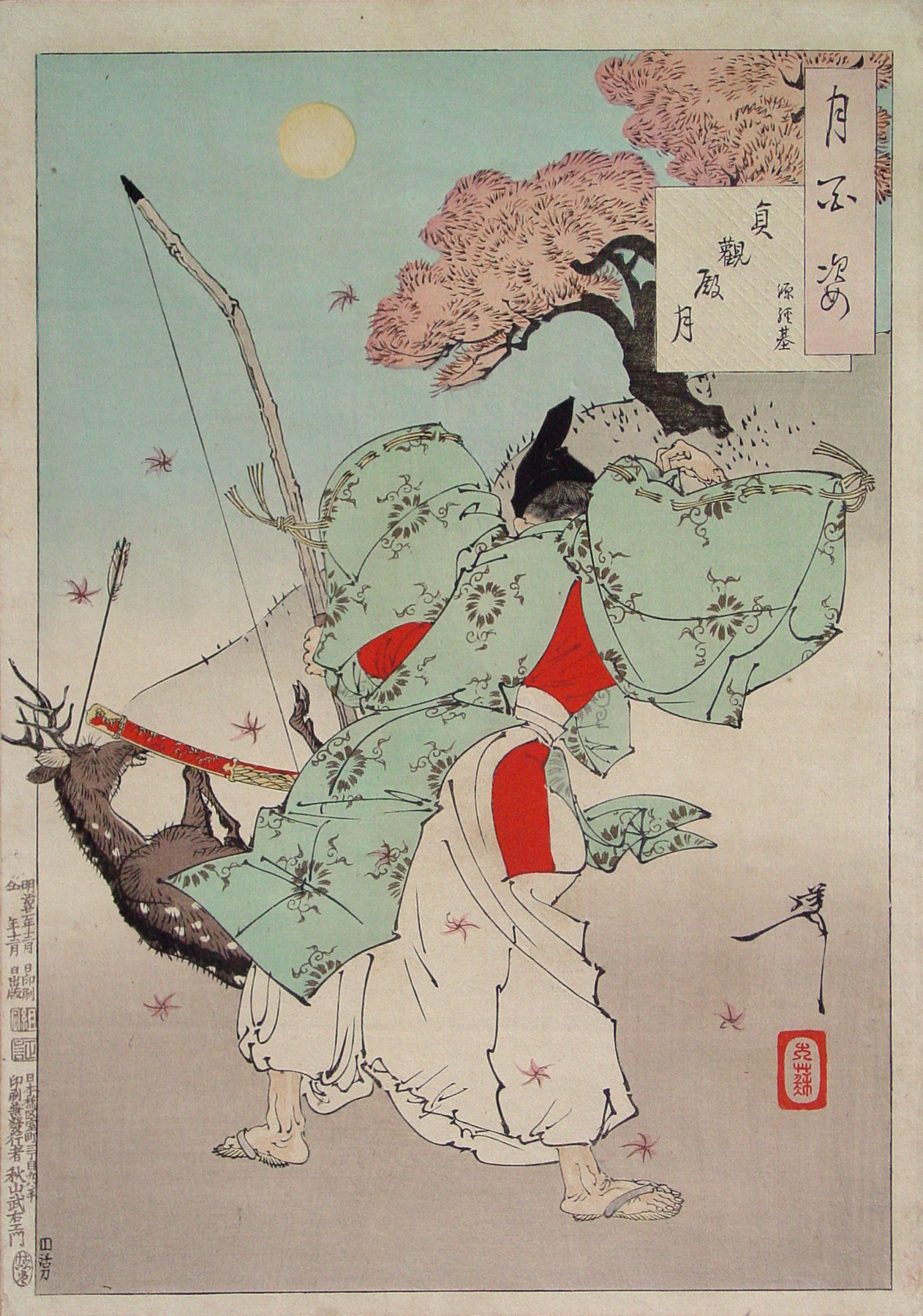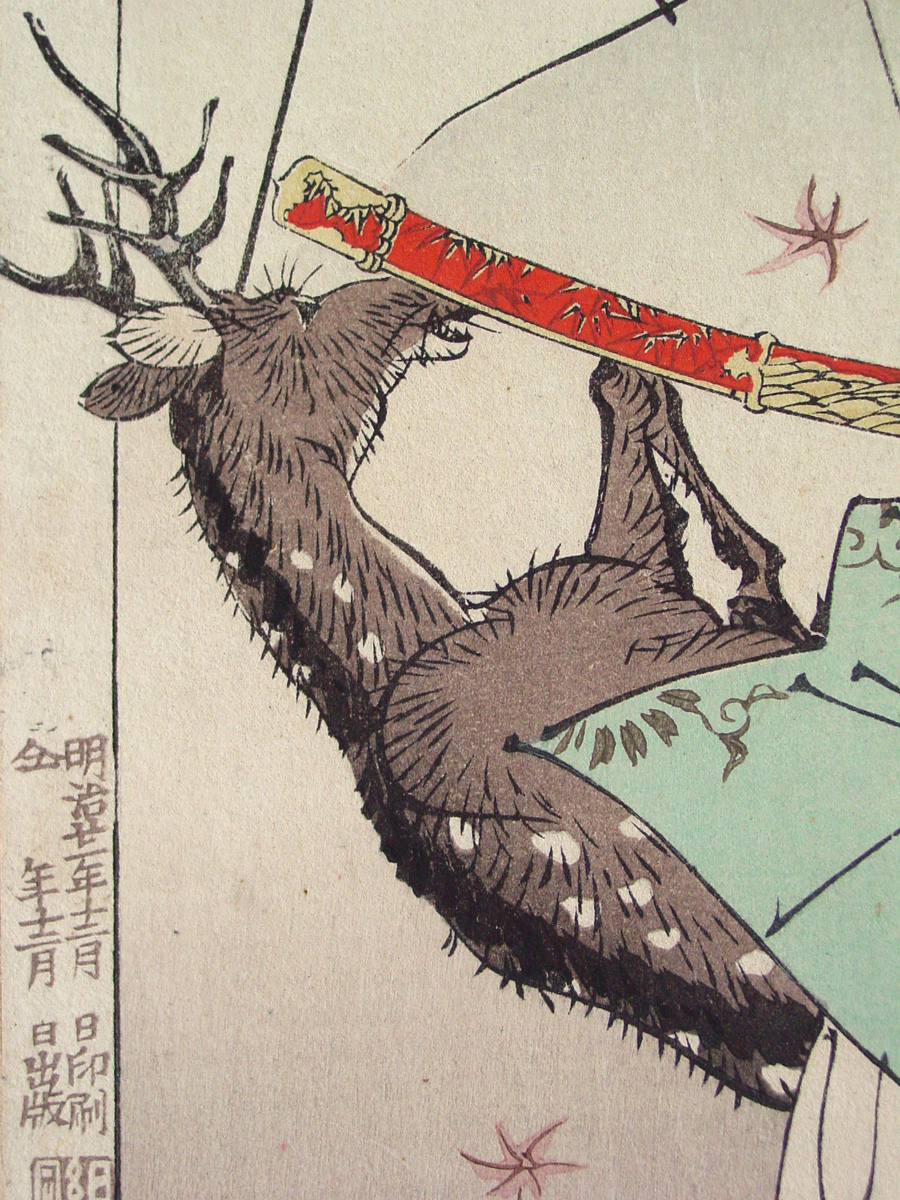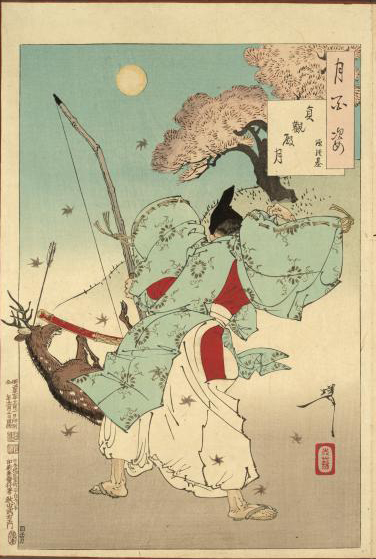About This Print
Minamoto no Tsunemoto (A.D. 917- 961) was a fine poet and skilled in the martial arts. One night near Jōganden, a building in the Imperial Palace in Kyoto, he shot a demonic deer that was about to attack the Emperor.
This print is from the album issued by publisher Akiyama Buemon shortly after Yoshitoshi's death and retains its original album backing.
The Story Depicted in the Print as Told by John Stevenson
Source: Yoshitoshi's One Hundred Aspects of the Moon, John Stevenson, Hotei Publishing, Netherlands 200167.
Jōganden moon - Minamoto no Tsunemoto
Jōganden no tsuki - Minamoto no Tsunemoto
Minamoto no Tsunemoto was a high-ranking courtier of the tenth century, a poet famous for his tanka, and a general noted for his skill at archery. He founded the Seiwa-Genji line of the Minamoto family, from whom three shogun families, Minamoto, Ashikaga, and Tokugawa, each claimed descent.
The Jōganden of the title was a wing of the imperial palace complex in Kyoto. One moonlit evening in the autumn of 932, the Emperor Shujaku was strolling in the gardens of the palace when a demon in the form of a huge stag, with red eyes and dagger-like teeth, appeared on the roof of the Jōganden. Stamping and snorting, it was about to leap onto the emperor when Tsunemoto dispatched it with a single kaburaya, “turnip-headed arrow,” between the eyes.
Jōganden no tsuki - Minamoto no Tsunemoto
Minamoto no Tsunemoto was a high-ranking courtier of the tenth century, a poet famous for his tanka, and a general noted for his skill at archery. He founded the Seiwa-Genji line of the Minamoto family, from whom three shogun families, Minamoto, Ashikaga, and Tokugawa, each claimed descent.
The Jōganden of the title was a wing of the imperial palace complex in Kyoto. One moonlit evening in the autumn of 932, the Emperor Shujaku was strolling in the gardens of the palace when a demon in the form of a huge stag, with red eyes and dagger-like teeth, appeared on the roof of the Jōganden. Stamping and snorting, it was about to leap onto the emperor when Tsunemoto dispatched it with a single kaburaya, “turnip-headed arrow,” between the eyes.
The deer in this design exhibits nothing of the demonic character describe in the story, nor does the light coloration suggest menace; there is no sense of danger, merely a dead deer in the background. This lessens the impact of the print and must have been deliberate – Yoshitoshi was perfectly capable of designing horrible beasts. Perhaps in his maturity the artist is indicating that there never was a demon, that the creature was never anything but a harmless deer, and that demons are figments of our imagination.
Movement is beautifully conveyed by the drawing of Tsunemoto’s robes and the way his scabbard swings as he released his arrow. The pattern on his tunic was popular during the Heian period (794-1185) and was called seigaiha, “waves of the blue ocean;” in the Momoyama period (1576-1600) it was often used to decorate Noh robes. The falling maple leaves and the edges of the trees have been printed with an oxidizing pigment; later impressions of the design use a less subtle orange.
The imperial government’s control of the countryside was tenuous during this period of Japan’s history, and stories of demons around the palace may have been metaphors for robbers and bandits. Seven years after he killed the deer-demon, Tsunemoto again saved Emperor Shujaku, by alerting him to the rebellion of Taira no Masakado. The rebellion lasted five years and seriously weakened the Heian government. Tsunemoto then distinguished himself by putting down a series of revolts in Bungo province. He died in 961 at the age of sixty-eight.
About the Series "One Hundred Aspects of the Moon"For details about this series which consists of one hundred prints with the moon as a unifying motif, see the article on this site Yoshitoshi, One Hundred Aspects of the Moon.
Print Details
| IHL Catalog | #39 |
| Title | Jōganden Moon – Minamoto no Tsunemoto (Jōganden no tsuki - Minamoto no Tsunemoto 貞観殿の月 源経基) |
| Series | One Hundred Aspects of the Moon (Tsuki hyaku sugata 月百姿) |
| John Stevens Reference No.* | 67 |
| Artist | Tsukioka Yoshitoshi (1839-1892) |
| Signature | Yoshitoshi 芳年 |
| Seal | Taiso 大蘇 |
| Date | December 1888 (明治廿一年十二月 日 印刷 仝年十二月 日出) |
| Edition | Likely from the album issued by publisher Akiyama Buemon shortly after Yoshitoshi's death |
| Publisher | Akiyama Buemon (秋山武右エ門) [Marks: seal 26-132; pub. ref. 005] |
| Carver | Enkatsu Noguchi |
| Impression | excellent |
| Colors | excellent |
| Condition | good - minor marks, flaws and offsetting; Japanese album backing paper; minor soiling. |
| Genre | ukiyo-e |
| Miscellaneous | |
| Format | Oban |
| H x W Paper | 13 3/4 x 9 3/4 in. (34.9 x 24.8 cm) |
| H x W Image | 12 7/8 x 8 3/4 in. (32.7 x 22.2 cm) |
| Collections This Print | Yale University Art Gallery 2011.143.1.67; Collection University of Virginia Art Museum ; New York Public Library Humanities and SocialSciences Library / Spencer Collection; Hagi Uragami Museum (Yamaguchi, Japan) UO1568; Tokyo Metropolitan Library 加4722-72; The Tsubouchi Memorial Theatre Museum of Waseda University 201-4474; Ritsumeikan University ARC NDL-541-00-060and NDL-223-00-022 |
| Reference Literature | * Yoshitoshi’s One Hundred Aspects of the Moon, John Stevenson, Hotei Publishing, Netherlands 2001 |




